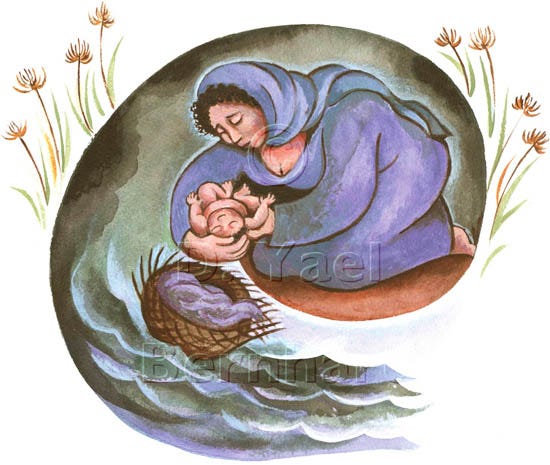Image of the Week: Yocheved & Moses

© D. Yael Bernhard
I don't often write about the story of Exodus at this time of year, as it comes up with the reading of the Torah portion Shemot, which occurs mid-winter – and is told again as part of the Passover seder. I delve into it now because it's part of my new calendar, The Jewish Eye 5783 /2023 Calendar of Art. Yocheved & Moses is the image for the month of January 2023.
The story begins with the birth of baby Moses to parents of the tribe of Levi. Like all the ancient Israelites, Moses and his family were slaves in Egypt, born into a bondage that had endured for four centuries. By the decree of Pharaoh – the supreme leader of the land in a time without human rights – all male babies born to the Hebrew slaves must be drowned in the Nile, lest their people become too powerful.
Moses' mother Yocheved employs a desperate sort of guile, and releases her son to the current in a basket sealed with pitch, giving her precious infant over to destiny and the unknown, beyond her caring and control. For any mother, such an act is unfathomable. Though she had no choice, she found a way to work within this narrow constriction to maximize her child's chance of survival – which he did. It was this moment – when there was nothing left to do but let go – that I chose to illustrate. The powerful river is depicted as a force of both nature and fate (inseparable in the ancient minds of our ancestors), curling around mother and child and carrying the future prophet away.
A dark moment, indeed. Yet even as Yocheved lets go of her baby, the protective eye of her daughter Miriam watches over him. She crouches in the bullrushes like a tiger, ready to pounce when the moment presents itself. Baby Moses is pulled from the water by the daughter of Pharaoh, who has come to the river to bathe and notices the basket floating by. She claims the child for her own. Quickly Miriam reveals herself and offers the baby's mother as a wet nurse. By a twist of fate too good to be true, Moses is returned to the arms of Yocheved to be nursed – but no longer as her own son. From here forward, he will be raised not as the child of Hebrew slaves, but the adopted son of the Egyptian princess.
Movement seemed like a crucial element to convey in this painting – a swirl of dark water and ominous clouds that engulfs the two subjects. I watered down my acrylics and made two layers of transparent washes in grey and teal, overlaid with charcoal clouds. The white background surrounding this turbulence serves to contrast its darkness. To accentuate the tender and vulnerable state of the infant, I drew him from a foreshortened perspective that emphasizes his precious little belly and pink frog-like limbs. Oh the deliciousness of a baby's body! I could just feel his soft hair in the palm of my hand . . . the warm fragrance of his skin, like freshly-baked bread. I drew upon my own memories of my children as babies – then tried to imagine being Yocheved, amplifying those feelings of love and concern in her body language and her furrowed brow.
In Hebrew the word for Egypt is Mitzrayim, meaning "the narrow place" – a place without choices, from which we must liberate ourselves and our thinking. Put that word in your search engine and you'll find all kinds of teachings. We all have tyrants within, and forces that constrict and enslave us. No wonder the story of Exodus is retold each year at Passover, and lies at the very foundation of the American Constitution, for this timeless tale speaks to the human condition in any era. I'm certainly not the first artist to illustrate baby Moses in his basket, and I won't be the last. It's a privilege to join this current of expression that flows through the ages.
This painting is for sale. Please inquire for more information if you're interested.
Rosh Hashanah is just five weeks away! You can find The Jewish Eye 5783 /2023 Calendar of Art in my webstore or on Amazon.
A good week to all –
D Yael Bernhard
http://dyaelbernhard.com
children's books • fine art • illustration
posters • cards • calendars



